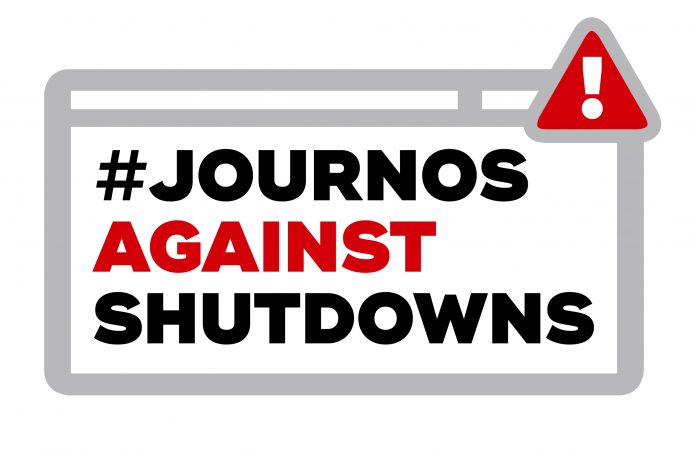#JournosAgainstShutdown – Fighting Internet Shutdowns
Internet shutdowns are a violation of fundamental human rights and it compromises freedom of expression, and freedom of peaceful assembly and association. It can also have a significant impact on press freedom. For all its economic, social and psychological impact on the state, media, and people, everyone should fight against internet shutdowns. Journalists and media, need to step up in the fight against internet shutdowns.
What can journalists do?
- Document incidents: Collect, monitor and share information on internet shutdowns to media and to the SAMSN Digital Hub. In India and Pakistan, information shared through media outlets is the main source of tracking on shutdowns. In India and Pakistan, internet shutdown trackers largely rely on news published on newspapers and websites to record the instances of shutdowns.
- Report on shutdowns: Publish articles when shutdowns happen, and report on the implications. During shutdowns, people can be affected in many ways. They may be unable to contact family and friends or access emergency services, they may suffer due to lack of information and in some cases become subject of state violence. Internet shutdowns also incur economic losses and importantly can block critical information getting out from a region or country. Journalists must be able to report on such implications in the public interest.
- Hold authorities to account: Make governments accountable, question shutdowns including the legal framework behind them. In some cases of internet shutdowns, there are written orders, in many others, the orders are either verbal or sent to internet service providers or telecommunication companies as confidential orders. Journalists should hold authorities responsible for internet shutdowns by asking questions about internet shutdowns, demanding reasons behind and legality of it.
- Demand paper trail: Use RTI and FOI laws to get access to shutdown orders, which are often not shared with the public. A right to information application may be helpful to get the documents and information on internet shutdowns. Telecommunication companies should be encouraged to provide or leak government orders so to as least have a paper trail and show what’s been happening.
- Urge governments to leave the internet on: Demand your government stop using internet shut-downs as a tool to control and suppress.
- Create solidarity and join campaigns: Journalists and citizens can join the campaigns to raise voices against internet shutdowns – specifically #journosagainstshutdowns for South Asia by IFJ / South Asia Media Solidarity Network. In India, there is “Don’t Shut India Down” campaign which has a public petition against internet shutdowns; whereas Bytes For All and Digital Rights Foundations are campaigning against internet shutdowns in Pakistan. There are also global campaign such as #KeepItOn by Access Now. Upload your own video speaking against internet shut-downs in YouTube or sharing IFJ Internet Shutdown campaign materials (found here) are some good ideas.
- Educate others: Journalists and media can publish resource materials telling people about tools and methods to circumvent internet shutdowns may help them to get access to internet in some cases.
- Challenge the legality of shutdowns: Internet shutdowns are often without a clear legal mandate and are justified by the misinterpretation of outdated or irrelevant laws. Internet shutdowns also violate the constitutional rights of freedom expression, so they can be challenged legally and in the courts.

Blogs
- #JournosAgainstShutdowns: A South Asian ConversationA Google Hangout by IFJ Asia Pacific
Crucial linkby Ujjwal Acharya (Nepal)
The New Normal Of Living With No Internet In Kashmirby Arshie Qureshi (India)
Invisible barsby Sam Jahan (Bangladesh)
Royal Kill-Switchinterview with Prateek Pradhan (Nepal)
E-curfews: Killing hope in Kashmirby Faisul Yaseen (Kashmir, India)
Internet: Oxygen for Journalismby Saadullah Akhter (Balochistan, Pakistan)
Shutdown trackers
Reports
- New Fronts, Brave Voices: Press Freedom in South Asia 2016-2017 (IFJ)
Breaking the Walls: The fight for freedom of expression in the digital space in South Asia (IFJ)
Anatomy of Virtual Curfews: Human Rights vs National Security (DEF)
Internet shutdowns cost countries $2.4 billion last year (The Brookings Institution)
The Economic Impact of Disruptions to Internet Connectivity (GNI)
Internet Shutdowns in 2016 (CIS - India)
Security v Access: The Impact of Mobile Network Shutdowns (IBHR)
Resolutions / Statements
- The promotion, protection and enjoyment of human rights on the Internet (UN HRC)
The Freedom Online Coalition: Joint Statement on State Sponsored Network Disruptions
Let's Keep The Internet On For Everyone (Internet Society)
#InternetOfRights: Creating the Universal Declaration of Digital Rights (Article 19)

